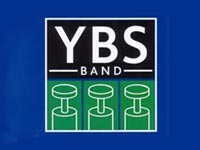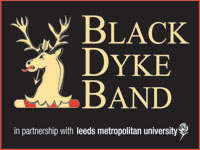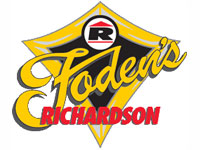British Open Gala Concert
13-Sep-2006Black Dyke; Fodens Richardson; YBS; BAYV Bands
Conductors: Nicholas Childs; Garry Cutt; David King; Robert Childs
Symphony Hall
Birmingham
Sunday 10th Sptember
The concert given on the Sunday after the Open has become known in recent years for the variety of music presented, and for the relaxed atmosphere following on from the tensions of the previous day.  This year proved to be no exception, with the YBS Band under their charismatic conductor David King - complete with flowing locks which caused some confusion as to who was conducting - opening the proceedings with a programme drawn largely from works commissioned by the Yorkshire Building Society for various previous
This year proved to be no exception, with the YBS Band under their charismatic conductor David King - complete with flowing locks which caused some confusion as to who was conducting - opening the proceedings with a programme drawn largely from works commissioned by the Yorkshire Building Society for various previous
gala concerts.
On the same stage where Peter Graham's "Windows of the World" was premiered as part of the 2000 European Championships they performed four of the movements - none of the choreography this time, but abundant energy and verve, crisp playing with each section coming through where appropriate.
Right from the opening notes of "Amazonia" the band seemed totally committed, with the chants being convincing, which is not always the case, whilst Sheona White's horn solo in "Rainforest" was as fluent as ever, followed by a tender duet played face to face with Robert Richardson's baritone. "Drums of thunder" opened enthusiastically, with the three percussionists being kept busy, and the cornet section coping with the
scalic passages effectively. The solo in "Earth Walk", played so memorably by Ben Godfrey at the premiere, seemed to hold no fears for the band's current repiano player, whose stylish and confident reading earned her a well-deserved round of applause, whilst the band's guest soprano for the weekend, Willebroek's Bert Van Thienen, made the first of many telling contributions to their programme.
As a number of latecomers entered the hall and took up their seat, David King encouraged the audience to let their hair down and relax, before introducing Sheona White to play Kenneth Downie's "Piper of Dundee".
Written for her during his spell as Composer in Residence with the band, it suits her style perfectly, as she demonstrated both her pure, clear sound and also her phenomenal technique, with immaculate phrasing,
particularly when moving off the trills into the following phrases, and excellent control over the whole range of the instrument. The accompaniment from the band was first class, never swamping the soloist, with fine work from the bass trombone.
During the band's recent tour of Australia, one of the best received items was Goff Richards' arrangement of "I'll walk with God", and it proved equally popular with the Symphony Hall audience. Right from the
opening bars, with the muted cornets finely balanced, through the sustained lines in the euphoniums and horns, the band maintained a full sound, with the conductor adjusting the balance, particularly bringing out the percussion contributions.
David King amongst others has been instrumental in encouraging Robin Dewhurst, head of popular music at the University of Salford, to branch out into writing for brass and wind. "Celtic Fusion" was commissioned for the European Championships in Glasgow, and "Flight of the Wild Geese", the finale of that work, shows many celtic influences, particularly in the rhythmic passages. It offers each section the chance to shine, with
various solo lines, and the horn section were invited to take a bow in recognition for their heavy workload holding the ensemble together.
Principal euphonium Stephen Walsh was given the chance to display his dulcet tones and sensitive use of rubato in "Summer isle" from Philip Sparke's "Hymn of the Highlands" before the programme was brought to a close with Peter Graham's "Shine as the light". With driving rhythms from the start, and delicate arpeggios against the "Walk in the light" melody, the cornet runs were deftly handled, whilst Stuart Lingard displayed his customary assuredness with "The candle of the Lord". The aleatoric section was totally convincing, with the pattern totally secure whilst the band intoned the "Light me" motif, after which the trombone-led melody "The light has come" burst through the texture, drawing the piece to a close, with the
tam-tam adding its contribution to the final chords.
 Second to play was the BAYV Band under Robert Childs, whose first four items celebrated various aspects of the work of Elgar Howarth. The "Zurich march" had a good continental feel to it, complete with field drum, and various sections took their chance to shine, with a particularly powerful bass solo which nevertheless was not lacking in definition.
Second to play was the BAYV Band under Robert Childs, whose first four items celebrated various aspects of the work of Elgar Howarth. The "Zurich march" had a good continental feel to it, complete with field drum, and various sections took their chance to shine, with a particularly powerful bass solo which nevertheless was not lacking in definition.
Robert then showed he was in his customary good humour as he congratulated his brother Nicholas and Black Dyke o their win, going on to say that they (BAYV) were not going to appear in 2007, they were just going to have the second prize sent to them! The band then launched into the tour de force for band "Pell Mell", written under the nom de plume "W Hogarth Lear".
Opening with trills running down the band , fearsome scales followed, with the cornets rising to their feet. Section work for euphoniums and baritones led into a triplet variation on the trombones, and then a passage for flugel and horns. Gavin Saynor despatched his variation with aplomb, assisted by xylophone and BBb bass before the opening passage was reprised, culminating in the whole band on their feet, and a smart turn towards the audience.
The audience at Symphony Hall has come to expect a solo of some sort from David Childs and they were not disappointed as he stepped forward to present Elgar Howarth's setting of "Jeanie with the light brown hair". Starting with the soloist alone, it is very lightly scored, with no cornets and only one bass until the final chords. David, who had received a Special Achievement Award the previous day, displayed his usual skill and musicality, and there was a feeling that the whole audience had been holding their breath as the item drew to a close. Following the report, Robert's response was that "He must have had a good teacher"!
The final Elgar Howarth item was "Hunting the Hare", an arrangement prepared for a US tour made by Grimethorpe and The Cory Band in 1976, bicentennial year. Written as a patrol, two tunes are used, "Hunt the hare" representing Wales and "A hunting we will go" for England, each approaching from the distance, and each presented in a different key. With the explanation given, the audience seemed ready to accept the subsequent discords as hunting calls were presented on horns, trombones and cornets before the two tunes came together, although the Welsh tune always seemed pre-eminent! At the end, the percussion simply faded away to nothing.
BAYV's trombone section were on top form all afternoon, and principal trombone Chris Thomas was featured as soloist in Aagaard-Nilsen's "Mosquito". As the title suggests, the music depicts a mosquito and
the attempts to catch it, with the band sometimes imitating the insect and sometimes acting as the fly-swat, although Chris was spared the indignity of dressing up in costume as had been observed in one Norwegian
performance.
Using a range of techniques such as wah-wah effects, lip trills and glissandi, and displaying considerable skill, Chris proceeded to win the audience over, and following his final slow pianissimo glissando to the top
of the register the audience burst into well deserved applause.
Gareth Wood has been appointed composer in Residence at BAYV, succeeding John Pickard, and they closed their programme with his new work "A tear in the fabric of time", inspired by the complexities of physics. Following a discordant, fanfare-like opening, with shot notes in the bass, and a delicate cornet-led section, sustained passages for euphonium and horn came across well. Various sections seemed to compete with one another over an obstinate in the bass before a central chorale passage, interrupted by the
percussion. A euphonium and horn duet, joined by solo cornet, led into a reworking of the opening Allegro, but with fewer discords, which, in the words of Bram Gay's programme note, went "careering to a violent end". As Robert called the composer to the stage the applause seemed more polite that enthusiastic from some quarters, but it is good to see such challenging works being given an airing on such an occasion. It is certainly a piece this reviewer would want to hear again, and bodes well for the future collaboration between composer and band.
 After the interval, it was the turn of Black Dyke Band, with the British Open Gold Challenge Trophy being brought onstage to the closing bars of their signature march "Queensbury".
After the interval, it was the turn of Black Dyke Band, with the British Open Gold Challenge Trophy being brought onstage to the closing bars of their signature march "Queensbury".
They opened their programme proper with Peter Graham's "Academic Fanfare", the cornets standing either side, trombones behind the horns and the basses where the solo cornets usually sit. Featuring the scholarly tune "Gaudeamus Igitur", familiar from Brahm's "Academic Festival Overture" and the musical "Student Prince" it proved an effective opener, with Peter Roberts carrying on his fine form from the previous day, when he had been awarded the Brian Evans Memorial Trophy for the best soprano cornet player.
Having returned to their usual seats, the band then presented Howard Lorriman's new arrangement of Richard Wagner's "Overture to the Flying Dutchman". The storm effects worked particularly well, as did the baritone imitation of the horn call, later echoed by the euphoniums and basses. Solos followed for horn, cornet and flugel, all played immaculately, whilst the trombone section cut through the texture where appropriate. The reading was notable for the depth and fullness of sound, whilst the arpeggios starting from the bottom of the band were faultless in their execution. The lead up to the final chord was enhanced by the use of tremolando effects.
Principal cornet Richard Marshall demonstrated his versatility by taking up the trumpet to play Kenny Baker's "Virtuosity". With his bight sound and technical fluency he almost made it sound too easy, and his playing was complimented by some excellent accompaniment, not least from the xylophone. The cadenza came complete with smears and growls, and he seemed totally at ease with the slower sections, sliding from note to note and slotting in additional phrases at will. As he reached his final top "F" the audience roared its approval.
The second soloist featured was Adrian Hirst on bass trombone with Alan Fernie's take on "Swing low, sweet chariot". Following a gentle quartet opening, the band moved, as Nicholas Childs put it, "into Pink Panther mode", and the soloist entered half way down the auditorium, then proceeding to surprise those audience members nearby with his excursions into the pedal register. Having reached the stage, he demonstrated his prowess across the whole range of the instrument, including a duet with bass player Joseph
Cook.
Black Dyke's final programmed item was the "Finale from the New World Symphony", arranged for the band by Joseph Nichol, their bandmaster before the First World War. This proved to be quite a tour de force, with a strong opening from the basses, and further chances for the trombones to shine as a section. The middle of the band sounded particularly strong, with some delicate arpeggio work on euphonium.
Nicholas Childs explained that he always liked to time the programme so as to allow for an encore, and this took the form of John Miles' "Music". After a gentle opening with two cornets supported by euphonium, the rock rhythms took over and the intensity increased. Impressive bass pedals led into the statement of the theme, and the finale was presented as a wall of sound, with the percussion working hard. It certainly seemed a popular choice with many of the cosmopolitan audience.
 Last on stage this year was the Foden's Richardson Band, conducted by Garry Cutt, who opened with Bram Gay's arrangement of Mozart's "Overture to the Magic Flute". As many bands had found in the contest the previous day, Mozart is not easy to bring off successfully on a brass band, but the band's
Last on stage this year was the Foden's Richardson Band, conducted by Garry Cutt, who opened with Bram Gay's arrangement of Mozart's "Overture to the Magic Flute". As many bands had found in the contest the previous day, Mozart is not easy to bring off successfully on a brass band, but the band's
reading was restrained and stylish, with dynamics scaled down and delicate placing of notes. Tempos were well judged and the timpani player, using hard sticks, was most effective.
There were just a couple of occasions when there seemed to be a little too much edge from the bass trombone, but then this reviewer was seated right opposite the player concerned!
Garry Cutt then introduced the band, speaking of how privileged he felt to be able to conduct the current North-West Area Champions, and the new English National Champions, and suggesting that nothing be said about their result from the previous day (where they had been placed 13th!).
Philip Sparke arranged Mozart's "Ave verum corpus" for the euphonium section of Kings of Brass, but it made for an effective item played by the two baritones two euphoniums of Foden's. The players took the melody in turn, and careful adjustment of the balance made it work, even when the euphoniums were in a subsidiary role, whilst the accompaniment omitted cornets and percussion.
Just as Wellington appreciated the arrival of Blucher and his Prussians on the field of Waterloo so the British Army has welcomed into its repertoire many Prussian marches, several coming from the pen of lankenburg.
"The Gladiator's Farewell" was presented in suitably Germanic style, with plenty of clashed cymbal, whilst Alan Wycherley coped manfully with the piccolo obligato. The back row cornets also demonstrated some fine triple tonguing in the trumpeting sections.
Ben Thomson is the current Radio 2 Young Brass Musician of the Year, and he was featured as the soloist in Martin Ellerby's "Tuba Concerto". In one movement, but divided into two sections, it proved an ideal vehicle for him to demonstrate his talent, both in the sustained passages and also the more florid sections. Following an atmospheric opening from the band, the soloist entered with a full, sustained sound, supported sensitively by the band, with glockenspiel and vibraphone prominent. Ben moved smoothly into the upper register, and then the faster sections found him very secure, with clean articulation and smooth phrasing. An outstanding talent in a very accessible piece, and very well received by the audience.
Two lighter items followed in the form of Goff Richards' "Songs of the Quay", featuring melodies from the North-east including "The Keel Row", and Ince's "Robbin' Harry". The latter featured Mark Landon on xylophone, who showed he was as adept with four sticks as with two, and seemed to be challenging the band to keep up him in the final section.
Foden's finale was Tchaikovsky's "Marche Slav", arranged by Leonard Davies. Opening on horn, joined by solo cornet, the playing was well-controlled, with solid work from the percussion section. The old imperial anthem was presented on the basses, with a rich, full sound, and the off-beat chords were precisely placed, whilst a subtle bass pedal led into the final segment, with the sound building up once more in somewhat brighter mood until it reached its triumphant conclusion.
As the band left the stage, a member of the audience was heard to remark "That was great", and so it had been: a variety of music presented by four first class bands, happy to make music away from the pressure of
competition. If the audience seemed a little smaller than previous years it may have been affected by the Birmingham Arts-Fest, which had involved numerous musical groups in Centenary Square and elsewhere over the weekend.
Peter Bale









